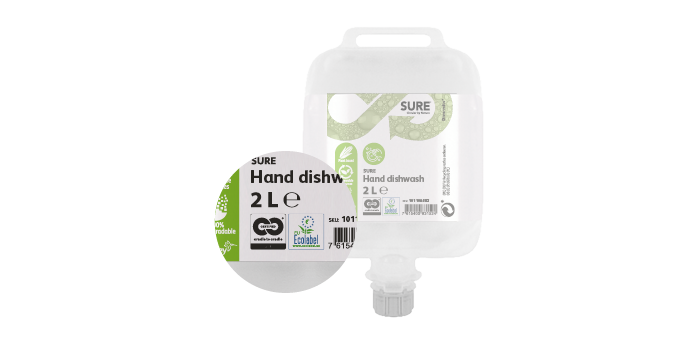The EU ecolabel helps inform EU consumers on products that meet the highest sustainability standards - read on to learn more!
What is the EU ecolabel?
Ecolabels are an essential part of how consumers of hygiene and cleaning products can quickly and easily verify the quality of a product, based on its sustainability and quality. This, in turn, helps them to make choices on the things they buy from an environmental perspective.
Established by the European Commission back in 1992, the goal of ecolabelling is to specifically identify products or services that have a reduced impact on the environment during their life cycle, thereby better supporting sustainability. Nowadays, the Commission maintains the scheme via the (EC) Regulation No 66/2010.
Since its inception, the reputation of ecolabels has grown to become something of a benchmark for promoting sustainability and providing clear, accurate information to European citizens. In critical industries producing products on an industrial scale, it’s a standard that is challenging to meet, but incredibly important to uphold.
Also known as the EU ‘flower’ thanks to their distinctive design, ecolabels balance sustainability with high quality, so consumers are able to purchase with the knowledge their goods are both of a very high standard, while also being sustainable. This is part of why they hold such a strong reputation, despite the saturation of ecological labelling that exists in industries like hygiene products, many of which don’t hold products to the same standards.

While voluntary, many brands seek to earn the European Union ecolabels due to the brand perception benefits they bring. EU law doesn’t require products to meet the standards, using public preference as a driver of ethical conduct in production, rather than enforcing rules on all manufacturers.
EU ecolabel criteria
The EU Commission now manages a vast directory of ecolabels. In 2022, 87.485 products have earned a label, in 30 countries in Europe and cover 24 product groups. Over that time, they’ve built fairly robust criteria for validating and accepting new products and services onto the directory.
What standards must a product meet to earn an ecolabel?
The integrity and high standards of the process are vital to consumer trust so that someone encountering an ecolabel, UK-based or anywhere else in Europe, knows that the product is really living up to the ecological standards it should be. The commission detail the following points as guarantees of any product bearing a European ecolabel:
- Good quality of product/service
- Reduction of animal testing
- Healthy and/or safe
- Reduced environmental impact, with a leaning towards tackling climate change
- Production processes that are both ethical and safe
- Chemical restrictions for hazardous substances
When do ecolabel standards apply?
These standards aren’t applied to part of the product’s lifespan, either.
Production is often perceived as the only relevant process to being ecological, but a product’s sustainability can also apply to its ability to be recycled or safely disposed of after its uses are exhausted. The criteria of an EU Ecolabel include every step of its lifecycle, from raw materials to disposal:
- Extraction, the mining or cultivation of the raw materials
- Manufacturing and packaging of a product
- Distribution of product
- Use of product
- End of life and disposal of product
It’s this element that makes the ecolabel so valuable and difficult to attain.
But looking at the process itself, how exactly does a product receive the ecolabel in the first place?
How products receive EU ecolabel certification
Firstly, not everything can qualify for an ecolabel.
On a basic level, any good or service supplied within the European Economic Area, in return for payment or made freely available can qualify.
However, ecolabels cannot be given to medicinal products, whether they have human or veterinary applications. Nor can they be given to food, beverage or feed products, due to the commission deeming it an unfeasible standard to guarantee due to the volume of these products, and the actual value an ecolabel adds to these sorts of products.
How does the EU organize the application process?
The EU uses third parties to verify products, chosen by EU member states selecting bodies within their governmental systems to ensure the process is consistent and effective. The producers are required to make an entry application which is then examined.
In terms of the third parties themselves, both inspection and certification rights are offered to them, so the process is relatively streamlined from member state to state.
If a product has origins outside of the EEA, even just an element of the raw materials used to produce it, the applicant is tasked with selecting a competent body from the countries where the product is going to be marketed, instead.
The EU provides a detailed list of all EEA countries (essentially just the EU, plus Lichtenstein, Norway and Iceland), plus their relevant inspecting bodies.
The EU ecolabel application process
The initial application is mostly administrative, with forms filled out and submitted, and relevant documentation provided.
There are some fees involved, including the costs of testing and assessing the claim.
Auditors are deployed once a claim is validated and, if a product meets the standards during an independent review, a registration number is supplied and the ecolabel can be included on the packaging.
There is an ongoing monitoring element, which features unspecified inspections of any of the relevant elements of the product’s lifespan detailed above.
Sustainable cleaning & the EU ecolabel
For cleaning and hygiene products, the process of achieving sustainable cleaning standards means seeking out the most biodegradable, plant-based or naturally-sourced products.
Brands with ties to agro-food industries are ideal, as the by-products of ingredients like coconut, sugar beet, maize or wheat bran contain nothing artificial, and especially none of the hazardous chemicals, which ecolabels expressly target as unacceptable.
The EU Ecolabel is a badge of honour within the hygiene and cleaning product industry. In addition, the EU Ecolabel is a testament to the ongoing commitment to both high standards of product and ecological protection, especially in the process of providing these products to other businesses, on a global scale.



